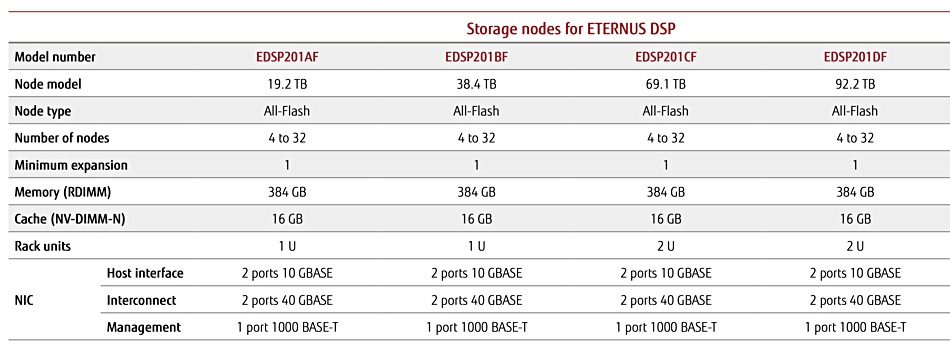Fujitsu has announced a server-based, scale-out storage system, the first in a new line branded ETERNUS DSP.
ETERNUS is Fujitsu’s overall storage brand and DSP is short for Digital Services Platform. The new DSP200 M1 is a multi-node all-flash storage system that provides multiple petabytes of block and object storage for physical servers, VMs and containers.
The DSP200 M1 is designed for continuously available tier one performance and is a hyperscale system, according to Fujitsu. The system scales out to 2.9PB of capacity – which seems a bit on the small side of hyperscale.
The system is based on X86 server nodes – no CPU detail at time of writing – with an undisclosed number of storage drive bays. It comes in 1U and 2U enclosures.

There are four node capacity variants, all using SATA SSDs: 19TB or 38TB in a 1U enclosure, and 69TB and 92TB in a 2U enclosure. The minimum system has three nodes with 57TB capacity and it scales out to 32 nodes and 2.944PB.
Fujitsu documentation does not disclose the number of drive bays per node or the individual SSD capacities.

The 2U node image above shows 24 drive bays. A 32-node maximum capacity of 2.944PB implies a per-node maximum of 92TB. Spreading that across 24 drives implies 3.83TB SSDs. This is low, considering that 15TB SSDs are readily available.
A 32-node system is claimed to provide up to 5.7 million IOPS, and latencies generally are at the 200us level. The cluster node interconnect uses 40GbitE.
The DSP software supports a maximum of 512 hosts and 4,069 LUNs. Fujitsu said there can be up to five replicas and 256 copy generations. The system provides system-wide, consistency group snapshots and features deduplication and compression.

Accessing servers use iSCSI across 10Gbit Ethernet, with two ports and NICs per node, to read and write data on the DSP system.
The self-tuning DSP software provides quality of service features. It monitors storage usage and load at each node, and can autonomously control data relocation and distribution to other nodes to balance the load. Management software is policy-driven and uses machine learning. It can be accessed by SNMP or REST APIs.
Fujitsu has not revealed any details of its object storage capabilities.
Management
There are multi-tenancy user access features, so that each user only sees and manages their own data.
New nodes can be added non-disruptively to a DSP system and have data automatically migrated to them. Existing nodes can be replaced in a sequential fashion.
Deployed systems send telemetry to a Fujitsu centre for use in system management. Blocks & Files expects this to develop into a classic predictive analytics management SaaS offering.
ETERNUS DSP is available to order in Japan and Europe starting May 28 from Fujitsu and its resellers. Pricing varies according to country and individual configuration; a typical Fujitsu pricing description, and there is a three-year warranty.
Brochureware
The ETERNUS DSP, as described in a Fujitsu brochure, is much higher spec than the DSP200 M1 and its 32 all-flash nodes.
For example the DSP “can run multiple service pools of 64 storage nodes each, and use any combination of storage device types including SATA HDD/Flash, NVMe Flash, NV-DIMM-N, rotating media, and persistent storage devices.” That’s doubled the maximum node count to 64.
Also, “the deployment of heterogeneous nodes with different hardware generations is possible.” Another DSP option is “flexible data tiering with the ability to run different price/ performance tiers in one cluster”.
So, we can anticipate more DSP announcements with support for nearline disk drives, NVMe SSDs, and Optane drives. Disk drive support will require a larger enclosure to hold the 3.5-inch drive bays needed.
Comment
Fujitsu says this is a software-defined storage system, but the software is available from Fujitsu only and it runs on Fujitsu hardware. Effectively, this is another proprietary scale-out storage system.
Today, Fujitsu announced an OEM deal with Datera, whereby Datera’s scale-out enterprise-class block and object storage runs on Fujitsu servers. Datera’s Data Services Platform is scale-out virtual SAN storage sotware that supporting bare metal servers, virtual machines and containers. It provides block and object access and is an alternative to both traditional SANs and hyperconverged infrastructure systems.
Ok – <Smacks head> – Fujitsu’s DSP is this system. Although unsaid, it is obviously based on Datera’s software. (We’re checking of course.) That means it is using Datera’s object storage with its S3 interface. And it is non-.proprietary software-defined storage.








